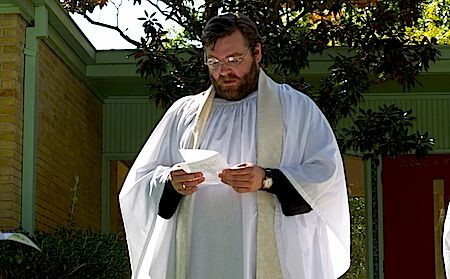The Three-Legged Stool of Anglicanism
The image of a three-legged stool enjoys a wide variety of applications today, including retirement planning, various business strategies, and even ‘classical’ Reaganism! The image is especially useful for those who wish to present certain ideas or principles as essential to the integrity of the whole. Many voices in our tradition have adopted the three-legged stool as a convenient way to explain the nature of Anglicanism, especially in relation to other churches. It is commonly said that Anglicanism looks to three inter-dependent sources of authority—Scripture, reason, and tradition—and that these three sources “uphold and critique each other in a dynamic way.” This view of Anglicanism was perhaps made most-popular in recent times by Urban T. Holmes in his book What Is Anglicanism?
The classic expression of the Anglican understanding of authority comes from Richard Hooker (d. 1600), favorite of Queen Elizabeth I and ardent preacher against the Puritans, whose masterful work Of the Laws of Ecclesiastical Polity has been perhaps the authoritative voice of classic Anglicanism. In Book 5 he writes on the nature of authority in the Church, where we find what is probably his most famous passage:
“Be it in matter of the one kind or of the other [i.e. doctrine vs. church practice], what Scripture doth plainly deliver, to that the first place both of credit and obedience is due; the next whereunto is whatsoever any man can necessarily conclude by force of reason; after these the voice of the Church succeedeth. That which the Church by her ecclesiastical authority shall probably think and define to be true or good, must in congruity of reason overrule all other inferior judgments whatsoever.” (V.8.2)
When I read this, I don’t see a ‘three-legged stool’ but a careful and helpful explanation of how we best interact with Scripture in trying to understand what is best for the life of the Church in our time. The ‘plain’ words of Scripture, that is, those parts that are more or less straightforward and clear, have first claim on our trust and obedience. And as Bishop John Bauerschmidt has recently explained, for Hooker ‘reason’ comes in as the comprehending and ordering ability of the human mind, trying to discern those aspects of our faith that are unchangeable doctrine, or teaching, and those things which are practices the church has adopted as convenient for a particular time and/or place. And in order to help ‘reason’ in its work, the tradition of the church comes alongside to help reason along.
Various images come to my mind in trying to illustrate this relationship between the Scriptures, reason, and tradition; the image that comes to mind currently is that of an apprentice learning a trade under the supervision of a master craftsman. My first job as an assistant priest was at an historic parish; it was a real treat to get to know some of the skilled tradesmen that came to work on our building, including a master plasterer and his apprentice. There was no getting around the rules of the trade. The plaster was what it was, and there were certain ways of applying it that worked, and others that didn’t. For the apprentice, applying the plaster in a certain repair required both knowledge of the medium and the skilled guidance of his master in the best application for that particular patch. For Hooker, we all are apprentices in the Christian life, and in order to apply our knowledge of the Scriptures rightly we need the accumulated wisdom and experienced guidance of those who have mastered the craft before us.
Need we be exactly like our forebears in the Christian faith? Hooker’s answer is a qualified ‘no.’ Yet he wisely knew there’s no getting around the truth of the ‘plaster’, i.e. the plain teaching of the Scripture being what it is; and there’s no getting around the fact that some methods of applying that ‘plaster’ work much better than others. The ‘reasonable’ reader of Scripture isn’t a reckless and revolutionary apprentice aiming at an aggressive deconstruction and critique of the text, but rather the one who is truly ‘reasonable’ will enjoy the guidance of the church and appreciate it as an aid and check to our own understanding and application of the truths of our faith within the life of the church in our own time. The former produces a sloppy and unsuitable result. The latter results in a portion of work that blends in and harmonizes with the overall beauty of the original craftsmanship, to the point of hardly being able to notice a repair had even been made. The satisfaction lies in knowing that a glorious and precious work has been preserved intact for the next generation to enjoy.
The Rev. Dr. Jeremy Bergstrom is the Canon of Vocations for the diocese



